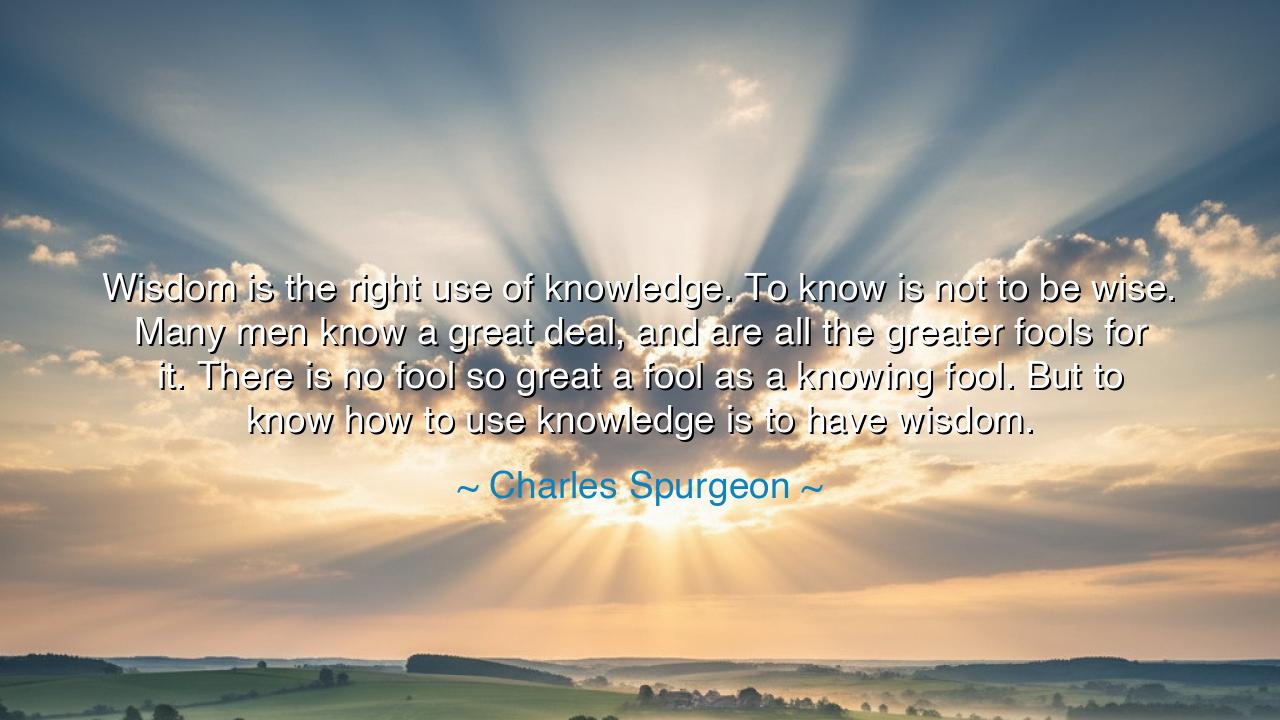
Wisdom is the right use of knowledge. To know is not to be wise.
Wisdom is the right use of knowledge. To know is not to be wise. Many men know a great deal, and are all the greater fools for it. There is no fool so great a fool as a knowing fool. But to know how to use knowledge is to have wisdom.






Listen, O seeker of understanding, to the profound words of Charles Spurgeon, who proclaimed: “Wisdom is the right use of knowledge. To know is not to be wise. Many men know a great deal, and are all the greater fools for it. There is no fool so great a fool as a knowing fool. But to know how to use knowledge is to have wisdom.” In these lines lies a truth as ancient as the hills: that knowledge alone does not crown the mind, but only when guided by discernment, virtue, and prudence does it transform into wisdom. Mere learning, without application, is like a sword unsharpened, beautiful yet powerless; wisdom is the edge that strikes with purpose.
The ancients understood this intimately. In the halls of Athens, the philosophers debated not merely to amass facts, but to cultivate practical insight. Socrates, though aware of the vastness of human ignorance, pursued a life of questioning, reflection, and application. He knew that knowledge without judgment could breed arrogance and folly. Spurgeon’s observation — that a man who knows much may be the greater fool for it — is echoed in the lives of men who, armed with learning but devoid of prudence, cause ruin through misapplied intellect.
Consider the story of King Solomon, who, though endowed with unparalleled knowledge and understanding, achieved true renown not merely through knowing, but through the judicious application of insight to governance and justice. His wisdom manifested when he discerned truth in the conflict of two women claiming a child — an understanding of human nature, combined with deliberate action, revealing that wisdom is the practical use of knowledge. Knowledge alone would not have resolved the dispute; only its right application did.
History offers countless warnings of the “knowing fool.” Consider generals who studied war, who knew strategy, tactics, and the histories of past battles, yet failed disastrously because they lacked judgment in the moment, misreading the character of their men or the cunning of their foes. Alexander the Great himself was fortunate to combine knowledge with keen intuition and adaptability; others, equally learned, fell to pride or rigidity. Spurgeon’s insight rings true: to know much and yet act unwisely is a perilous state, a folly greater than ignorance itself.
The quote also illuminates a moral dimension: knowledge untethered from ethics and prudence can lead not only to personal ruin but to harm of others. The learned man, blind to the moral implications of his actions, may craft ingenious schemes that serve neither justice nor the common good. True wisdom, by contrast, guides knowledge toward virtue, shaping decisions that honor both reason and conscience. In this lies a principle that spans the ages: the mind, illuminated by knowledge, must be steered by a soul attuned to right action.
From Spurgeon’s teaching emerges a clear and timeless lesson: acquire knowledge, yes, but temper it with reflection, judgment, and ethical consideration. Do not be content merely to know; seek to understand the consequences, the human dimension, and the proper application of what you learn. The knowing fool may be admired for erudition, but the truly wise are revered for their deeds, their discernment, and their capacity to apply insight for the greater good.
Practical counsel flows from this eternal truth: cultivate learning not as an end, but as a tool. Pause before acting on what you know, weigh outcomes, and seek guidance from reflection and experience. Observe the patterns of human behavior, test principles in action, and integrate moral judgment with intellectual understanding. In doing so, knowledge is transformed from mere accumulation into living wisdom, capable of shaping lives, communities, and history itself.
Thus, O listener, let these words of Spurgeon resonate in your soul: knowledge is the seed, wisdom is the harvest. Learn diligently, but apply judiciously. Let each insight guide action, each fact illuminate judgment, and each discovery be tempered by prudence and virtue. In this lies the path to greatness, not of mere intellect, but of character and enduring wisdom, for it is in the right use of knowledge that humanity finds its truest strength.






AAdministratorAdministrator
Welcome, honored guests. Please leave a comment, we will respond soon